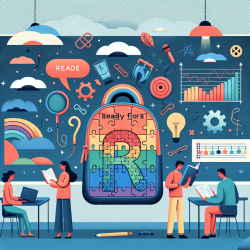Introduction
The COVID-19 pandemic has reshaped many aspects of our lives, including how children learn and develop literacy skills. The research article "Family learning and working in lockdown: Navigating crippling fear and euphoric joy to support children’s literacy" offers insights into how families can support literacy development during challenging times. This blog post will explore how practitioners can implement these findings to enhance literacy outcomes for children.
Understanding the Research
The study provides a nuanced perspective on family learning during the pandemic, focusing on two families from Scotland and Michigan. It highlights the importance of viewing learning as a holistic experience that extends beyond academic skills to include emotional and experiential learning. The research challenges the "catch-up" narrative, emphasizing that children were constantly learning in diverse ways during lockdowns.
Key Findings and Implications
- Holistic Learning: The study underscores the importance of considering the whole child in learning processes. Practitioners should encourage activities that integrate emotional, social, and cognitive development.
- Family Engagement: Families played a crucial role in supporting literacy through creative and playful activities. Practitioners can guide families to create engaging learning environments at home.
- Challenging the "Catch-Up" Narrative: The research suggests that the focus on learning loss overlooks the diverse learning experiences children had at home. Practitioners should recognize and value these experiences in their teaching approaches.
Practical Strategies for Practitioners
Practitioners can implement several strategies to improve literacy outcomes based on the research findings:
- Encourage Play-Based Learning: Integrate play into literacy activities to make learning enjoyable and meaningful for children.
- Support Family Involvement: Provide resources and guidance to help families engage in literacy activities at home. This could include creating home libraries or suggesting literacy-rich play activities.
- Focus on Emotional Literacy: Incorporate activities that promote emotional understanding and expression, as these are vital components of literacy development.
Encouraging Further Research
While the study offers valuable insights, it also highlights the need for further research into family learning dynamics during the pandemic. Practitioners are encouraged to explore this area further to develop more effective strategies for supporting literacy in diverse contexts.
To read the original research paper, please follow this link: Family learning and working in lockdown: Navigating crippling fear and euphoric joy to support children’s literacy.










